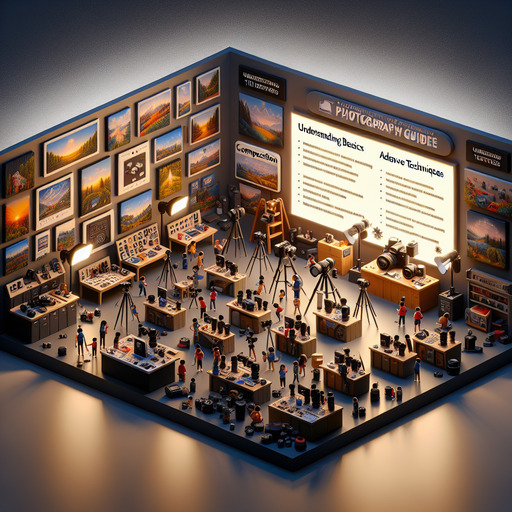
-
Table of Contents
- Mastering Photography: Essential Tips and Techniques for Every Photographer
- Understanding the Basics: Photography Techniques
- Composition: The Art of Framing
- Lighting: The Key to Captivating Images
- Advanced Techniques: Elevating Your Photography
- Portrait Photography: Capturing Personality
- Landscape Photography: Embracing Nature’s Beauty
- Editing: Bringing Your Vision to Life
- Photography Editing Tools
- Conclusion: Elevate Your Photography Skills
- Questions and Answers
Mastering Photography: Essential Tips and Techniques for Every Photographer
Photography is more than just capturing moments; it’s about telling stories, evoking emotions, and creating art. Whether you’re a budding photographer or a seasoned professional, understanding the nuances of photography can elevate your work to new heights. In this guide, we’ll explore essential photography tips, techniques, and insights to help you refine your craft and produce stunning images.
Understanding the Basics: Photography Techniques
Before diving into advanced techniques, it’s crucial to master the basics. These foundational skills will serve as the building blocks for your photography journey.
Composition: The Art of Framing
Composition is the arrangement of elements within a photograph. A well-composed image can draw the viewer’s eye and convey a powerful message.
- Rule of Thirds: Divide your frame into a 3×3 grid and position your subject along these lines or at their intersections for a balanced composition.
- Leading Lines: Use natural lines in your environment to guide the viewer’s eye towards the main subject.
- Framing: Use elements like windows or arches to frame your subject, adding depth and focus to your image.
Lighting: The Key to Captivating Images
Lighting can make or break a photograph. Understanding how to manipulate light will enhance your images significantly.
- Golden Hour: Capture photos during the first hour after sunrise or the last hour before sunset for soft, warm lighting.
- Natural Light: Utilize available light sources, such as windows, to create natural and flattering portraits.
- Artificial Lighting: Experiment with flash and studio lights to control shadows and highlights.
Advanced Techniques: Elevating Your Photography
Once you’ve mastered the basics, it’s time to explore advanced techniques that can add a professional touch to your work.
Portrait Photography: Capturing Personality
Portrait photography is about capturing the essence of a person. Here are some tips to create compelling portraits:
- Engage with Your Subject: Build rapport to make your subject comfortable, resulting in more natural expressions.
- Focus on the Eyes: The eyes are the focal point of a portrait. Ensure they are sharp and well-lit.
- Experiment with Angles: Try different angles to find the most flattering perspective for your subject.
Landscape Photography: Embracing Nature’s Beauty
Landscape photography allows you to capture the grandeur of nature. Here are some techniques to enhance your landscape shots:
- Use a Tripod: A tripod ensures stability, especially in low-light conditions, allowing for longer exposures.
- Incorporate Foreground Elements: Add depth to your images by including interesting foreground elements.
- Play with Shutter Speed: Use long exposures to capture motion, such as flowing water or moving clouds.
Editing: Bringing Your Vision to Life
Post-processing is an essential part of modern photography. It allows you to enhance your images and bring your creative vision to life.
Photography Editing Tools
There are numerous editing tools available, each offering unique features to refine your images.
- Adobe Lightroom: Ideal for batch processing and color correction.
- Adobe Photoshop: Offers advanced editing capabilities for detailed retouching.
- Capture One: Known for its powerful color grading tools.
Conclusion: Elevate Your Photography Skills
Photography is a journey of continuous learning and experimentation. By mastering the basics, exploring advanced techniques, and refining your editing skills, you can create images that captivate and inspire. Remember, the key to great photography is practice and passion.
For more insights and resources on photography, visit Wikipedia’s Photography Page.
Questions and Answers
Q1: What is the best time of day for outdoor photography?
A1: The best time for outdoor photography is during the golden hour, which occurs shortly after sunrise and before sunset. The light is softer and warmer, creating a pleasing effect.
Q2: How can I improve my portrait photography skills?
A2: To improve your portrait photography, focus on engaging with your subject, ensuring the eyes are sharp, and experimenting with different angles to find the most flattering perspective.
Q3: What are some essential photography gear items for beginners?
A3: Essential gear for beginners includes a reliable camera, a versatile lens (such as a 50mm prime), a sturdy tripod, and a basic lighting setup like a reflector or external flash.
If you’re interested in learning more about photography or our services, please contact us for more information.